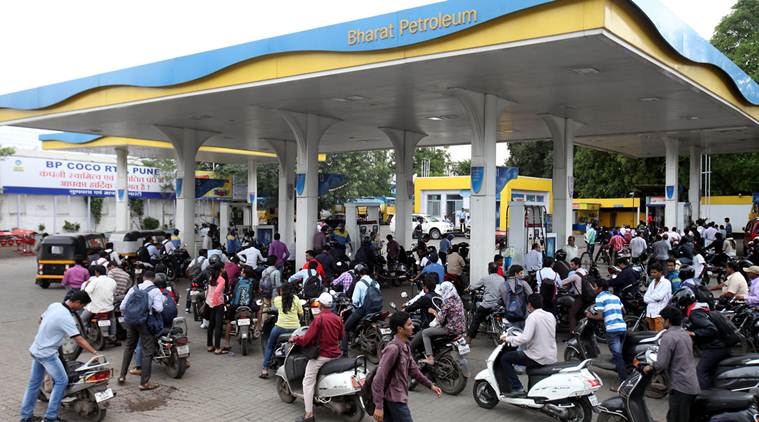India’s petrol woes
September 18, 2017 | Expert Insights

Petrol and diesel prices in India are at a three year high. This despite the fact crude oil prices have almost halved during the period.
What is the ultimate price that the common man will have to pay for this surge? Will the daily revision of fuel prices help in the long run?
Background
Globally, petrol and diesel prices vary in accordance of crude oil prices, processing and distribution costs. It also depends on local demand, the strength of the currency and taxes. This also depends on availability. Petrol prices aren’t the same in India. It varies from city to city in the country. These prices depend on state taxes as well as on import locations.
On June 16, 2017, the government of India introduced daily revision of petrol and diesel prices. This, the authorities said, would help decrease the prices of fuel. In the first few weeks, there was a slight drop in the prices of petrol. However, in matter of just weeks, from July 3rd 2017, the petrol and diesel prices have been on the rise. There have only been a few occasions when this wasn’t the case and prices went down by just 2-9 paise per litre according to PTI.
Indian Oil Corporation had once stated that "Daily price revisions of Petrol and Diesel will make the retail prices more reflective of the current market conditions, minimizing the volatility in the RSP (Retail Selling Prices) of Petrol and Diesel.”
Prime Minister Modi has been campaigning for GST since 2014. Goods and Service Tax is a value added tax, which is multi-stage and destination-based taxation on each stage of good and service production as well as generation. It is part of his economic agenda to reform India. However, petrol and diesel covered under GST in India.
Analysis
Currently the petrol prices have increased exponentially, especially in Mumbai and Delhi. On September 12th 2017, the price of petrol in Mumbai cost Rs 79.48 per litre. In Delhi, it cost Rs 70.38 per litre. Diesel prices also went up with its being priced at Rs 62.37 per litre in Mumbai and Rs 58.72 per litre in Dehi. The price of petrol since July 1st has increased by Rs 5.18 per litre in Mumbai and Rs 5.75 per litre in Kolkata. The price has increased by Rs 5.71 in Chennai.
The government has blamed the spike in the increase of these prices to external factors including the weather. Authorities have stated that Hurricane Irma (which struck the US recently) was partly to blame. This is because the hurricane damaged US refineries thus affecting oil prices. However, experts have said that international crude prices are not to blame. The prices of crude oil have decreased in the recent past. The prices of international crude oil prices have nearly halved in the recent years. However, that hasn’t been reflected on the end consumer. The government had increased excise duty on petrol and diesel.
Additionally, the government has blamed individual states for increasing Value Added Taxes (VAT).
Oil Minister Dharmendra Pradhan has said that the government does not have any immediate plans to curb the prices of petrol and diesel. When questioned, "if such an agenda was in the pipeline," he said, “Not yet. When situation arises, we will see.”
Assessment
Our assessment is that the rise of petrol and diesel prices not only affects macroeconomics but comes with immediate and negative consequences for the common man. Simply put, the average Indian has got to pay much more. Where are all these expenditures coming from? Are we moving towards a low interest, low growth but high trajectory inflation?








Comments